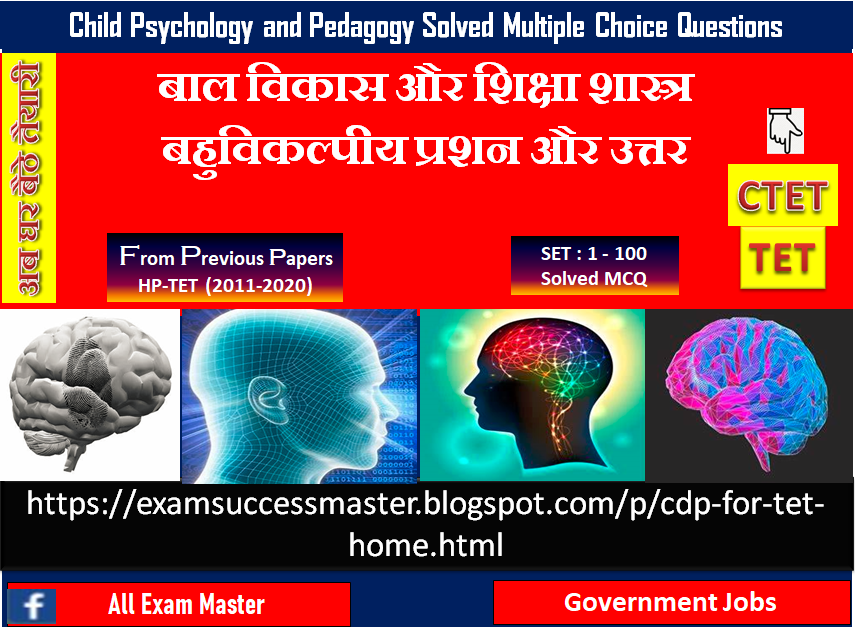Child Development and Pedagogy for TET Exam
बाल विकास और शिक्षा शास्त्र बहुविकल्पीय प्रश्न
Welcome to our exclusive collections of previously asked Child development and Pedagogy (CDP) multiple choice questions (MCQ) asked in previous HP-TET Exams. Child development is the very important section for TET exams. In this section 30 question will be asked and candidates can score above 25+ marks easily. In this section mainly questions asked from inclusive Education, child development, and learning pedagogy click given below link in bottom of each page for complete study notes of child development..
इस पोस्ट में हम बाल विकास और शिक्षा शास्त्र से सम्बंधित कई महत्वपूर्ण बहुविकल्पीय प्रश्न प्रस्तुत कर रहे है , जो कई प्रतियोगी परीक्षाओ में पूछे जाते है. जैसे TET, CTET, JEE, AIPMT, PMT, Police exams ,army exams, CDSE , SBI Clerk , SBIPO, PO, RRB , IBPS PO , PSc, State PSC, Patwari, Samvida, Teacher recruitment test, UPSC, SSC, CGL, SI, CTET, TET, CDS, MAT, SSC 10+2, CLAT, NIFT, SBI, IBPS Clerk, Vyapam, आदि.
Child Development and Pedagogy for TET Exam | SET – 26
Question : 1-10
Question : 1
A child having some problem in seeing objects. Acc. To NCF 2005 he should be admitted in
[A]. Open school[B]. Special school
[C]. Inclusive School
[D]. Integrated School
Asked in:HP TET Non-Medical-Nov-2019
Question : 2
The greatest contribution of psychology to education is
[A]. Subject oriented education[B]. Teacher oriented education
[C]. Activity oriented education
[D]. Child oriented education
Asked in:HP TET Non-Medical-Nov-2019
Question : 3
Constructivism as deserption of human cognition is often associated with educational approaches that promote
[A]. Active Learning I.e Learning by doing[B]. Observe Behaviour change
[C]. Internal mented processes
[D]. Conditioning
Asked in:Himachal Pradesh TET JBT/D.El.Ed-2013
Question : 4
Education is manifestation of perfection already present in Man, Who said this :
[A]. Vivekananda[B]. Aristotle
[C]. James
[D]. Dyanand
Asked in:Himachal Pradesh TET Medical-2017
Question : 5
Which is the first stage in child’s thinking according to Bruner ?
[A]. enactive[B]. iconic
[C]. symbolic
[D]. none of these
Asked in:Himachal Pradesh TET Non-Medical-2014
Question : 6
Vygotsky’s sociocultural theory suggests that a child’s most important discoveries guided by :
[A]. Other Children[B]. Adults acting as tutors
[C]. Neither other children nor adults acting as tutors
[D]. Both other children an adults acting as tutors
Asked in:Himachal Pradesh TET JBT/D.El.Ed-2013
Question : 7
If a student comes late to the school on a daily then it will be appropriate to
[A]. Through Him out of class[B]. Punish him in presence of student
[C]. Complain to the principal that he is always late
[D]. Find out the reason for his behaviour
Asked in:Himachal Pradesh TET Non-Medical-2014
Question : 8
Theory of Generalisation was put forward by :
[A]. Tolman[B]. Skinner
[C]. Freud
[D]. Charles Judd
Asked in:Himachal Pradesh TET ARTS 2017
Question : 9
An ideal Teacher should concentrate :
[A]. On teaching methods[B]. On the subject being taught
[C]. On students and their behaviour
[D]. All of these
Asked in:Himachal Pradesh TET Medical-2017
Question : 10
यदि आपके ध्यान में आया कि आपकी कक्षा का विद्यार्थी घर पर माता-पिता के विच्छेद होने से संबन्धित समस्याओं का सामना कर रहा है, आप क्या करोगे ?
[A]. इस विषय पर विद्यार्थी से कोई बात चीत नही करेंगे ।[B]. उससे सहानुभूतिपूरवक व्यवहार करेंगे ।
[C]. माता-पिता से बातचीत करेंगे ।
[D]. छात्र के प्रति तटस्थ रहेंगे ।
Asked in:Himachal Pradesh TET ARTS 2012
To Read Next Set
Click on below links
- Child Development and Pedagogy for TET Exam
बाल विकास और शिक्षा शास्त्र बहुविकल्पीय प्रश्न | SET – 25 - Child Development and Pedagogy for TET Exam
बाल विकास और शिक्षा शास्त्र बहुविकल्पीय प्रश्न | SET – 26 - Child Development and Pedagogy for TET Exam
बाल विकास और शिक्षा शास्त्र बहुविकल्पीय प्रश्न | SET – 27 - Child Development and Pedagogy for TET Exam
बाल विकास और शिक्षा शास्त्र बहुविकल्पीय प्रश्न | SET – 28 - Child Development and Pedagogy for TET Exam
बाल विकास और शिक्षा शास्त्र बहुविकल्पीय प्रश्न | SET – 29 - Child Development and Pedagogy for TET Exam
बाल विकास और शिक्षा शास्त्र बहुविकल्पीय प्रश्न | SET – 30 - Child Development and Pedagogy for TET Exam
बाल विकास और शिक्षा शास्त्र बहुविकल्पीय प्रश्न | SET – 31 - Child Development and Pedagogy for TET Exam
बाल विकास और शिक्षा शास्त्र बहुविकल्पीय प्रश्न | SET – 32 - Child Development and Pedagogy for TET Exam
बाल विकास और शिक्षा शास्त्र बहुविकल्पीय प्रश्न | SET – 33 - Child Development and Pedagogy for TET Exam
बाल विकास और शिक्षा शास्त्र बहुविकल्पीय प्रश्न | SET – 34
Please Read These Useful Post Also
कृपया इन्हें भी पढ़ें
MCQs Practice Sets for Sure Success in all competitive exams
- HP GK MCQs
- HP GK in Hindi
- Indian GK
- Indian History
- Geography
- Indian Politics
- Insian Economy
- Constitution of India
- Indian Railaway
- Computer Awareness
- Environmental studies(EVS)
- CTET
- Sports GK
- World GK
- HP-TGT Commission
- HP TET
- Current Affairs
- Psychology
- Psychology(Hindi)
- Physics Solved
- Biology Solved
- English Grammar
- Banking Exam MCQs
- HP-TGT-NM-Commission
- HP-TGT-Medical-Commission
- HP-TGT-Arts-Commission
- HP-TGT-LT-Commission


No comments:
Post a Comment